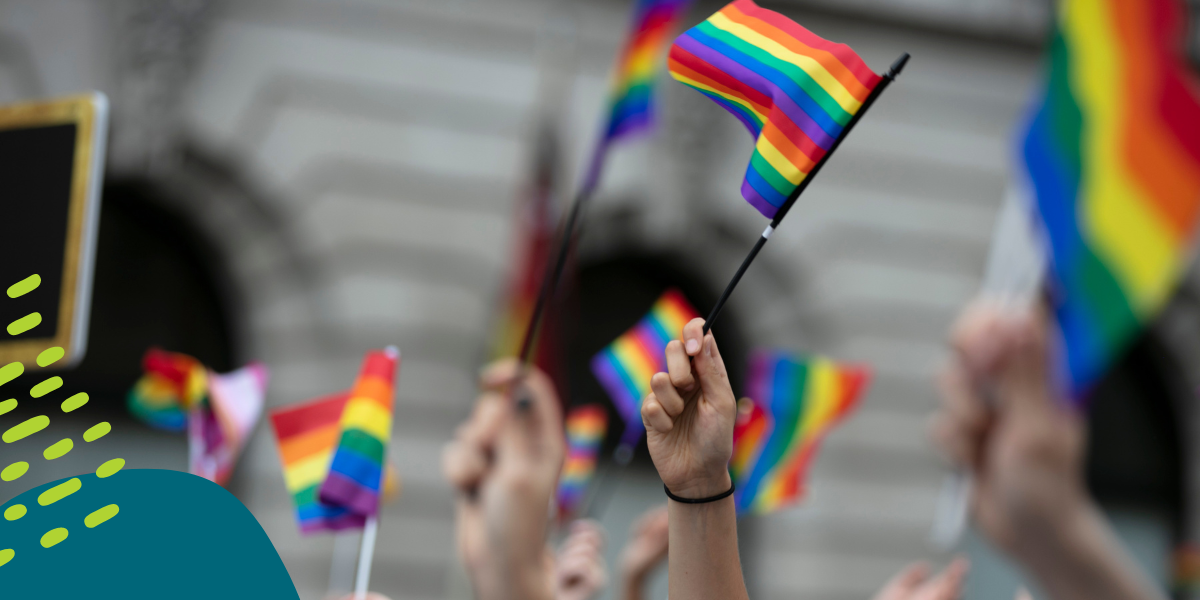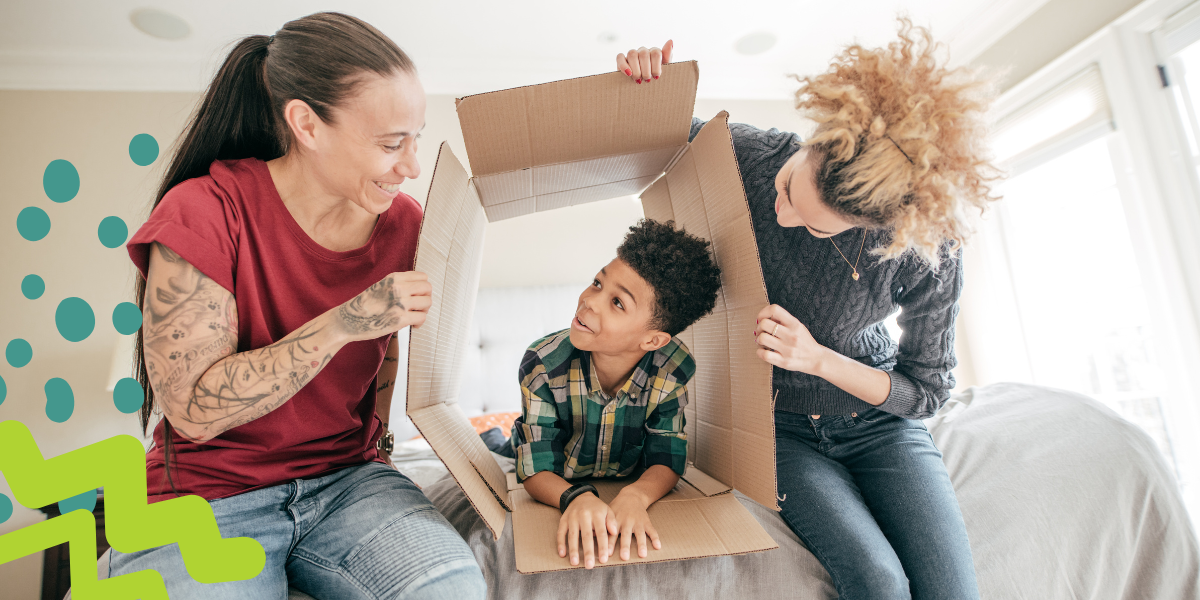
As an LGBTQ+ Parent, Should I Complete a “Second-Parent” Adoption?
By Bo Janes , Director of Growth
May 5, 2023
4m read
As an LGTBQ+ Parent, Do I Need to Adopt My Own Kid?
Falling under the category of “annoying, but very important,” we advise all families who identify as LGBTQ+ to strongly consider second-parent adoption of your child. And yes, this is whether you have biological or adopted children!
Follow along as we answer common questions surrounding the second-parent adoption process and how to get the process started.
So What is Second Parent Adoption & Why Is It So Necessary?
Second parent adoption (also called “co-parent adoption”) is the legal process of adopting a partner’s biological or legal child, when a person is not biologically or legally related to the child. While second parent adoption wasn’t designed with LGBTQ+ families in mind, it has been a common practice since the 1990s as a way to secure parentage. This may be the case if the parents used donated sperm or eggs to create their family, or if one partner had children prior to the relationship, either through adoption or biological means. Co-parent adoption can be used to establish a legal relationship in any of these cases.
While this post largely focuses on families created with donor sperm or eggs, it is still important to recognize the legal process of adoption and birth certificate amendment for LGBTQ+ families.
Once the adoption is finalized, the final Order of Adoption (or Decree of Adoption) will allow for the Vital Records department to amend and issue a new birth certificate - listing you as the parents, and sealing the original birth certificate. Usually, you will be listed as ‘Parent’ and ‘Parent.’ Having a birth certificate with your names on it, as well as an Order of Adoption, means you won't need to complete a Second-Parent Adoption.
After the landmark reversal of Roe v. Wade, rights of LGBTQ+ individuals and families across the US came under attack when Supreme Court Justice Clarence Thomas stated in his concurring opinion in Dobbs, that the court “should reconsider '' other cases involving the right to privacy, including 2015′s Obergefell v. Hodges decision, which legalized gay marriage. Same sex couples across the country feared for their rights.

The question on everyone’s mind became - how do I protect my family?
If you are an LGBTQ+ couple that used, or is using, donor sperm or eggs to grow your family, at some point you may have to amend your child’s birth certificate for both of you to be listed. Most states have amended their outdated laws to account for married same-sex couples to both be listed on a birth certificate.
In some states that don’t, you can complete a Voluntary Order of Parentage - a quicker process than a second parent adoption. If you are unmarried, you will still need to complete a second parent adoption.
No matter the circumstances, you cannot rely on having both parents’ names on birth certificates alone (regardless of your state of residence).
Unfortunately, some states legally can, and will, ignore a birth certificate (we’re looking at you, Mississippi). According to the National Center for Lesbian Rights, “having your name on the birth certificate does not guarantee protections if your legal rights are challenged in court — only an adoption or parentage judgment can ensure that parental rights will be respected.”
While we don’t agree with current public policy on this topic (and are making efforts to fix this issue at the federal level), it is the current reality, and we want to make sure you are fully informed. Protecting your family is the first priority!
Here is a scenario where enhanced legal protection could matter: you are taking your family on a road trip to, say, the national parks within the Western region of the US (visiting Washington, Oregon, Idaho, California, Utah, Nevada, Arizona, etc.). You have a major car accident where the child and one parent get injured. To ensure the other parent has full legal authority to make legal & medical decisions for the child, having a “Second-Parent” adoption in place makes this a non-issue. Whereas, having only a birth certificate could leave your parental rights in question (depending on the state where the accident occurs).
Keep in mind, it’s not just this one scenario where having a second-parent adoption is important. Whether it’s a separation or one parent becomes incapacitated (for whatever reason), it’s important that both parents have full legal rights for the protection and safety of your child.
Laura Lee Abby and her wife detailed their journey through second-parent adoption and the community they found, stating “Legal issues differed across states, but there was one thing all of us had in common: We would do anything in our power to protect our families.”
Advocates of second-parent adoption, Family Equality, share that “any challenge to your relationship with the child is eradicated,” safeguarding your family from interference from anyone, anywhere.

Common Questions about Co-Parent Adoption
Why is co-parent adoption especially important for families with same-gender parents?
Because of outdated assumptions about parents and families, the parental rights of same-gender parents may be questioned more often than those of a family with a mother and father — even when one parent is not genetically related to the child.
Do heterosexual couples need to follow second-parent adoption policies?
No, straight parents do not have to deal with this issue (hence “annoying”). Still, making sure you don’t have to endure discrimination (by the mere questioning of your legal standing) during a situation that is likely to have heightened stress already, is important.
How do I complete second-parent adoption?
Contact an attorney to get the adoption process started. If you are an LGBTQ+ family with a child (or planning to have children), we strongly recommend you contact an attorney listed in your state on our Adoption Professionals Page.
Are there legislative and policy efforts being made to improve this inequity?
Yes! LGBTQ Legal Advocates & Defenders and others are working to legalize co-parent adoptions in states where it is not yet available, and simplify the process in states where it is available. For example, a group of parents in Rhode Island is currently advocating to simplify the co-parent adoption process for all families.
How can you help make a difference?
Every small action can produce progress. You can help these efforts by:
- Educating yourself about laws on parentage and co-parent adoption in your state
- Writing letters to to your state legislators
- Testifying when co-parent adoption laws are being considered
- Sharing your story if you have gone through the co-parent adoption process
Find more information from the Family Equity Council and the National Center for Lesbian Rights.
If you are an LGBTQ+ family with a child (or planning to have children), we strongly recommend you contact an attorney listed on our Adoption Professionals Page (in your state of residence).
 Bo Janes
Bo Janes is the Director of Growth at PairTree. He has a special place in his heart for LGBTQ+ families, and has worked with dozens of LGBTQ+ families on their adoption journey since joining PairTree. Bo lives in Seattle with his boyfriend Andy, and their fur baby Matia.
Bo Janes
Bo Janes is the Director of Growth at PairTree. He has a special place in his heart for LGBTQ+ families, and has worked with dozens of LGBTQ+ families on their adoption journey since joining PairTree. Bo lives in Seattle with his boyfriend Andy, and their fur baby Matia.


